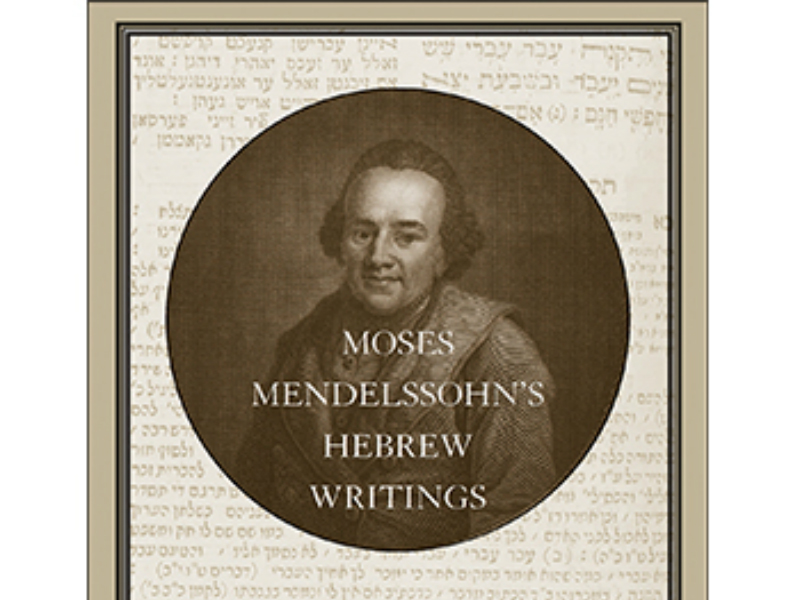Contemporary Jews who think about Moses Mendelssohn (1729-86) tend to see him either as a hero or a villain. Many venerate him as the father of the Jewish Enlightenment, the champion of emancipation of the Jews of Europe, the thinker and activist responsible for knocking down the walls of the ghetto. But as the Encyclopedia Judaica notes, many traditionalists see Mendelssohn as “a demonic historical figure, a destructive force responsible for all the crises of the modern era: assimilation, the demolition of the traditional community, the loss of faith, religious permissiveness and the weakening of the authority of the rabbinical elite.”
Mendelssohn had excellent traditional training in classical Jewish texts. In secular subjects, he was mostly self-taught, yet he became a respected German philosopher. In 1763, he won first prize in an essay competition on metaphysics put on by the Berlin Royal Academy of Sciences. (Immanuel Kant won second prize.) His philosophical works, written in German, were read widely by gentiles and Jews during his lifetime and for generations after.
Mendelssohn also wrote prolifically in Hebrew, and now lengthy samples of these writings are available to English readers. Moses Mendelssohn’s Hebrew Writings, a handsome 500-page volume introduced and annotated by Edward Breuer and David Sorkin, is part of the prestigious Yale Judaica Series. Breuer, a Canadian who made aliyah, teaches in the Jewish history and contemporary Jewry department at Hebrew University in Jerusalem. Sorkin, meanwhile, is a professor of modern Jewish history at Yale University. Both are recognized Mendelssohn scholars.
Mendelssohn was an accomplished Hebraist, bemoaning “how our Jewish brethren have abandoned our holy language.” His beautiful, challenging Hebrew is full of allusions to biblical verses and other Jewish classics. Translating texts like these is not easy, but Breuer has risen to the challenge. Breuer and Sorkin’s detailed introductory essays and helpful annotations bring the historical period alive and explain Mendelssohn’s role in it.
READ: SEEING MARRIAGE THROUGH THE PRISM OF TIME
Mendelssohn’s Hebrew writings have been neglected in recent years. According to Breuer and Sorkin, one reason is that many academics “Germanified” Mendelssohn, arguing that only his German works were important. This misunderstanding, Breuer and Sorkin argue, may have started with Mendelssohn’s own assimilated son, Joseph, who “projected his pronounced ambivalence to things Jewish onto his father, inspiring striking misconceptions that have circulated widely ever since…. He argued that Mendelssohn calculatingly continued to observe Jewish law since otherwise he could not influence his fellow Jews.”
The second reason for neglect is that most traditional Jews shy away from Mendelssohn’s Hebrew writings, assuming that they subvert tradition. Breuer and Sorkin argue that this, too, is a misconception. The depth, breadth and piety of Mendelssohn’s scholarship in his Hebrew books make it impossible to think that he wrote them just as a cover for his unbelief.
Mendelssohn’s Humash (the Five Books of Moses) – consisting of his translation of the biblical text into German, along with a commentary in Hebrew – is widely considered his most important Jewish work, and selections from it form the centrepiece of this book. In their introduction to it, Breuer and Sorkin explain that Mendelssohn was concerned that Jews were using either poor German translations that were then available from other Jews, or better but biased translations done by Christians. He undertook to give Jews a good German translation that reflected Jewish values and interpretations. Mendelssohn himself wrote much of the lengthy Hebrew commentary on the biblical text, while the rest was written under his supervision.
In large part, the commentary is a compendium of the best of traditional Jewish Bible interpretation. His Humash was reprinted many times and became the most popular Jewish Bible (other than the classic Humash with Rashi) in the generations after his death. His explanations of Torah texts were quoted widely by respected Orthodox rabbis at the end of the 18th century and throughout the 19th.
Mendelssohn’s Torah commentary reflects his erudition, piety and Jewish pride. For example, he writes, “It is true and evident that Moses transcribed the entire Torah, from the beginning of the book of Genesis until ‘before all Israel’ (the last phrase in the Torah), from the dictation of the Almighty.”
Furthermore, “The entire account of Creation and everything that scripture related with regard to Adam and Eve and Cain and Abel is without doubt completely and unfailingly true.” In his commentary to Exodus 15, Mendelssohn argues for the superiority of biblical Hebrew’s poetic style over other forms of poetry. Jewish poets chose this style “so that the words might enter not only the listener’s ear, but also into his heart.”
Mendelssohn did have an agenda in his Hebrew writings, but not the anti-religious one often attributed to him. This new book provides strong support for the thesis that Breuer advanced in his first book, The Limits of Enlightenment: Jews, Germans and the Eighteenth-Century Study of Scripture: that Mendelssohn’s Hebrew works prove “his fidelity to rabbinic and medieval biblical scholarship and his efforts to defend it against the beginnings of German textual criticism (i.e. biblical criticism) and a renewed European antipathy to rabbinic exegesis.”
In other words, far from being an enemy of tradition, Mendelssohn was an enthusiastic booster of Jewish Bible commentaries of the past. He used them to argue against more radical contemporary Enlightenment figures, both Jewish and Christian, whom Mendelssohn saw as inimical to traditional Judaism. His defence of earlier commentators, along with his own worthwhile insights, can now reach the wider Jewish audience they deserve.
